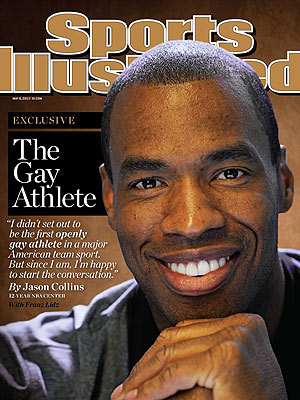 |
| Credit Sports Illustrated |
While I recognize the point that is being made that a number of lesbians who are professional athletes are coming out of the closet, I think something is getting lost in the 'yeah, yeah, Jason Collins but...' chorus and it is this: somewhere in America, right this moment, there is a young black man around the age of 15. Maybe he lives in the suburbs and he knows he's just a little bit different from the other boys. Like a lot of middle class black kids, his parents take him to church and likely he has heard at least one sermon in his life about 'the gays'. It is a near certainty that he has heard negative comments about 'fags' or 'punks' or some other slur. If he plays a sport either in school or an outside league that rises to an absolute certainty. Maybe he lives in a rural Louisiana town. Maybe he lives in Chicago or New York or Oakland or Los Angeles. He could be anywhere. He may not have realized that he could *be* anyone.
Yesterday that young man's life got better. Much better. Suddenly, that young man knows not only that he is not alone but that he can be *anything* and be a strong black man who gets to go home to the man that he loves. He knows it in a way he likely didn't know the day before yesterday. Certainly he's aware that there are gay people. He's very likely aware that there are black gay people. He may even know Bayard Rustin was gay and that Samuel Delaney was bisexual. Maybe. But Bayard Rustin and Samuel Delaney are dead and so occupy the realm of history, a country that we, as Americans, have only the vaguest sense of. Yes, Martina Navratilova did it first. Yes, a number of women did it before them. One of the women who has done so most recently is black, Brittney Griner of the Phoenix Mercury. If I were that 15 year old boy's sister, and I were a lesbian Brittney Griner would be the light of my world right now. I could have used a Brittney Griner 30 years ago.
I know it's silly and it shows my naiveté but I was an adult and only a year away from my coming out myself before I knew that there were black lesbians. I remember listening to Tracy Chapman's first album, hearing her sing "For My Lover" and I knew I wasn't alone. That *I*, too, could become somebody. Black lesbian and all and go home to the woman I hoped to love (and have been lucky enough to find). She meant the world to me but might have meant next to nothing to a young black gay man coming out at the same time. Maybe in a 'good for her' sense but not in a "I could be that one day" sense.
I'm not Tracy Chapman but when I had no place else to turn to look for someone else who loves women who looked something like me, Tracy Chapman was there. Later I found Audre Lorde and Adrienne Rich found out that Lorraine Hansberry was bisexual. I learned that I was nowhere near as alone as I thought. But Tracy Chapman and her first two albums, will always hold a special place in my heart because she, in that strange psychological interaction between a star and those who idolize her, made it okay for me to be a lesbian. Somewhere in America, there's a young black man who feels a little less alone. That may not mean a lot to middle-class white lesbians but it means a hell of a lot to some young black gay men. Hell, as a middle class black lesbian it means something to me. Not as much as Brittney Griner would have or Tracy Chapman did. But something special nevertheless. I'd like to think that those of us who had 'that day' when Martina Navratilova came out would let Jason Collins and his fans have theirs.
Maybe it shouldn’t be that way. Maybe it should be that anyone can look up to anyone else and to some degree that is true. My heroes and intellectual ancestors range over time and culture and ethnicity and place. But you know, if Alan Turing had been, say, Alana Turing that would have made his remarkable life all that more meaningful for me. Imagine being able to say, ‘there was this black woman who broke the Germans ENIGMA code and if any one person contributed singularly to the victory of the allies in WW II, it was her. She was a lesbian and…’ I love being able to say that about a white gay man from England. If I’d known about a black, lesbian codebreaker who is considered one of the singular minds of the last century and mother of the modern computer, it would have had a deep and profound impact on her. One of the uber-nerds of the last century a black lesbian? Oh the heaven to read about her in a history book! These things matter in some non-trivial psychological manner. I still look up to Turing. He had a hell of a mind and I’m glad we queer people get to claim him as one of ours.
